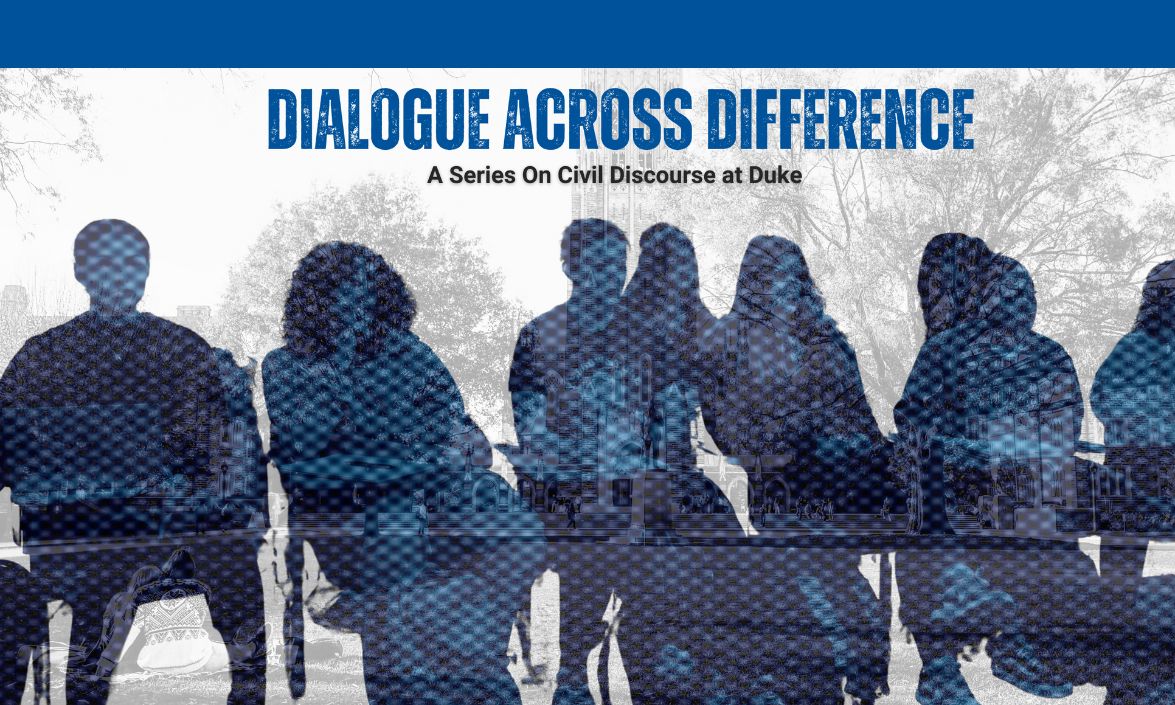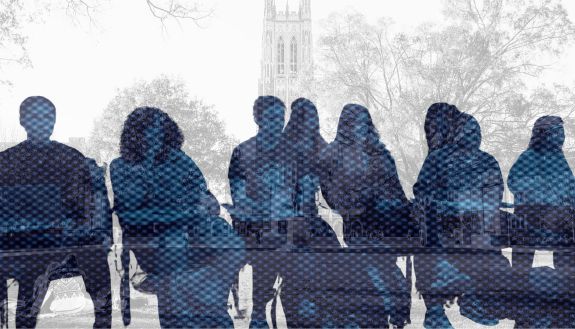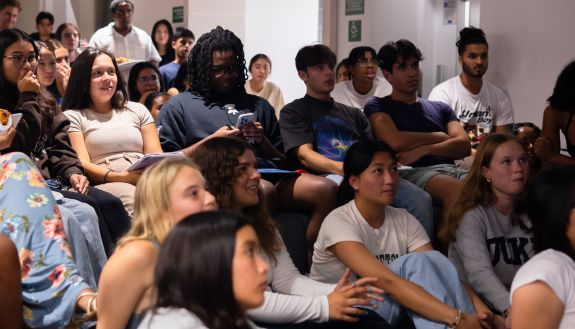‘I Came Looking for Hope, And Found It’
Duke’s summer sessions on civil discourse provide tools for faculty across the US

“I came to the Duke seminar seeking strategies to bring back to my campus, to find a community that shared my aspirations,” he said. “I came looking for hope, and found it.”
A primer on defusing tension
The sessions began in 2022 and involve table-top exercises, guest speakers and a list of recommended readings from diverse perspectives, among other activities, to help professors learn ways to defuse tensions and teach students to respect opposing views.
Opening night is a social gathering to get faculty more comfortable around each other. Sessions have included talks on “Discussion of Where the Students Are,” “Free Association, Echo Chambers and Academic Freedom” and “Challenges and Aspirations in Implementing Civil Discourse.”
“It is deeply reassuring to find faculty from around the country passionately dedicated to promoting wide-ranging and serious discussion about all important issues facing us today.”
Linda Rabieh, MIT
This year the number of participants doubled to 40 and the number of sessions expanded from one to two, held in May and June. The sessions last a few days and are not open to the public or media, so attendees feel more comfortable talking openly about their campus environments and concerns about polarization.
Participants often attend at the request of their school’s leadership. They come from a wide variety of colleges and universities, including MIT, Brown, UNC Chapel Hill, NC State, Arizona State, Elon and smaller Christian private schools such as Calvin University. (The seminars have been funded by the Arthur Vining Davis Foundations.)
“I attended in 2023, sent by my college because leadership knew I had been working for almost a decade to develop pedagogical strategies to help students learn to become calm and curious in the face of political difference and disagreement,” said Dana Nelson, chair of the English department and professor of American studies at Vanderbilt University.
“That work had resulted in a course I have taught numerous times (and am currently teaching) called ‘Why Argue About Politics?’” She also developed the course “Civil Dialogue/Free Speech: Why to Do It, and How."
The idea for the summer sessions came from John Rose, who until this fall was a visiting scholar and instructor at Duke’s Kenan Institute for Ethics, where he has taught courses related to civil discourse. (He leaves for UNC Chapel Hill this spring).
“Nobody gets a Ph.D. in civil discourse,” Rose said in an interview last year. “So the people who come to the summer sessions come from myriad disciplinary backgrounds and have myriad stories, like, ‘I had a falling out with a friend,’ or ‘I had a classroom discussion that went horribly bad.’”
Civil Discourse Summer Reading
Participants in Duke’s civil discourse seminar receive a list of suggested readings that represent a diversity of perspectives, including:
* Derisa Grant, “On Difficult Discourse”
* Amy Aldridge Sanford, “Confrontation and Avoidance: Alternatives to Civil Discourse”
* William Deresiewicz, “On Political Correctness”
* Amna Khalid and Jeff Snyder, “Yes, DEI Can Erode Free Speech. Let’s Not Pretend Otherwise”
With Rose exiting, Sanford School professor of the practice Abdullah Antepli has taken over as director of Duke’s Civil Discourse Project.
Antepli envisions breaking summer sessions into regional events aimed more granularly at issues specific to these areas. He noted that tensions at schools in the Northeast may differ from those on campuses in the South.
“They are struggling with different things,” Antepli said. “We would like to create a regional and maybe thematic focus areas where we don’t just go wide, but we go deep into these root causes of division and polarization and provide some strategies.”
Creating courses nationwide
Faculty often use lessons from the summer sessions to develop their own courses, a requirement of the session. Participants also agree to participate in a Zoom follow-up meeting within three semesters of the summer seminar, where they will present the results of their course to other participants.
“The resources the Duke program provided have been invaluable in helping me develop a similar course,” said Linda Rabieh, a senior lecturer in a program that bridges science and the humanities at MIT.
“Especially unique and illuminating were the rich, lively and open-minded conversations that the sessions prompted. It is deeply reassuring to find faculty from around the country passionately dedicated to promoting wide-ranging and serious discussion about all important issues facing us today.”
Michael Javen Fortner, a professor of government at Claremont University, attended this past June. He said the ideas he gained at the session have played a foundational role in the development of a new course he’s launching this spring, titled “Power, Politics, and Policy.”
“It challenges students to grapple with pressing issues like reparations, homelessness and drug policy, fostering an environment where differing perspectives are rigorously and respectfully debated,” he said. “The seminar offered invaluable insights and strategies for facilitating civil discourse in the classroom and beyond.”
The benefits for students
Micah Watson teaches politics and religion, and law at Calvin University in Michigan. The skills he gained at a 2023 Duke seminar have not only helped his teaching on campus, but also for a course he taught in a local prison.
“One of my students was a 70-year-old African American who has been incarcerated for several decades. I can’t put it better than he did in answering one of the questions on the final about our class and justice:
“‘Personally, the material and dialogue I have experienced in this class has certainly reminded me that my perspective is not the only way of seeing justice. That does not mean that my view of justice is invalid. Instead, it has convinced me that my viewpoint is only a small contribution to a much greater community of thought.
“By creating environments where students can safely explore challenging ideas about the First Amendment law and ethics while being pushed beyond their comfort zones into a ‘brave space’ learning zone, we’re ... preparing them for healthy citizenship in a complex democracy.”
J. Israel Balderas, Elon University
‘… In addition to listening to the viewpoints of others, I must also be able to accept and even empathize with their position even if I disagree.’”
Henry Thomson, an associate professor of political science at Arizona State, attended the summer 2022 session at the suggestion of his department chair. He said the session helped him develop a class for undergraduates to forge relationships with peers they may not have embraced before taking the class.
“Because I think undergraduates need to have more discussion-based classes in poli sci, it was a great opportunity to do something for our students that I would otherwise not have been able to do,” Thomson said.
“Many of the students in the class commented that it was one of the most valuable classes they had taken at university. They had never had the chance to openly debate political topics in their classes, which tend to focus on covering substantive material or teaching research methods, not discussion and debate.”
For Elon University’s J. Israel Balderas, an assistant professor of journalism, lessons he learned from the 2024 session “transformed not just how I teach, but how I think about education’s role in bridging societal divides.
“By creating environments where students can safely explore challenging ideas about the First Amendment law and ethics while being pushed beyond their comfort zones into a ‘brave space’ learning zone, we’re not just preparing students for successful careers,” he said, “We’re preparing them for healthy citizenship in a complex democracy.”



